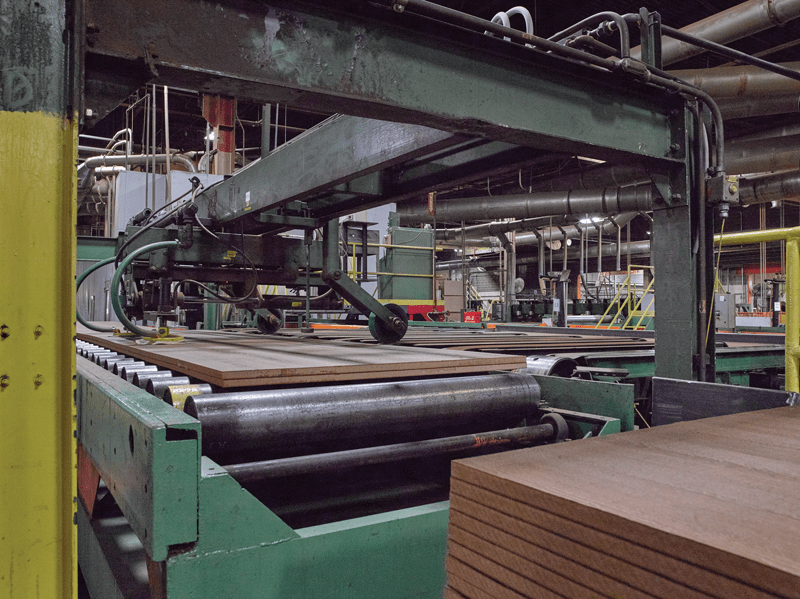Forced to Sell Door Skin Plant, Jeld-Wen Asks Production Details be Sealed
July 29, 2021 | Bill Esler
Towanda, PA — The long-running antitrust case between Steves & Sons Doors and Jeld-Wen appears near an end, with Jeld-Wen agreeing to Steves & Sons demands that it sell its door skin plant in Towanda, PA, the former Craftmaster Inc. operation it acquired more than 12 years ago.
In a 2019 settlement of the case, the U.S. District Court ordered Jeld-Wen to sell Towanda and Jeld-Wen has appealed continuously and lost. In the latest stage the case was been in the appeals process before the United States District Court in Eastern Virginia under District Judge Robert E. Payne. Now the adversaries are sparring over the divestiture process. A court-appointed Special Master has been overseeing the operations of the Towanda plant for two years, charged with assuring the integrity of the operation so that it can be successfully divested.

When Jeld-Wen first acquired CraftMaster, Steves & Sons had an ongoing agreement with CMI to supply door facings but over time had difficulty getting delivery, and claimed that Jeld-Wen was favoring itself and competitor Masonite. This and related battles have been costly for Jeld-Wen. Along with court costs, Jeld-Wen and its customer Masonite Doors paid $34 million to settle a separate restraint-of-trade case brought by independent building materials dealers. Jeld-Wen was sued for $40 million by shareholders over depressed stock prices, and in turn sued its insurance carrier to cover costs of that settlement.
Judge Payne allowed some records and details of the Towanda plant operation to be sealed, in the interest of protecting proprietary manufacturing processes—such as the MiraTec door skin system—established there by Jeld-Wen. Steves & Sons argued these records should now be unsealed, and the judge in charge ordered that to take place on August 6. Jeld-Wen wants to block the request for the records to be unsealed. Below, Steves & Sons attorney Lewis Powell argues against that request in an extract from a recent court document:
The Divestiture Plan and the Adversarial Process
JELD-WEN argues that it is inappropriate for Steves to have any role in the Special Master’s development of a divestiture plan. But, other than arguing that it is unfair to have a potential bidder provide input, JELD-WEN fails to articulate why Steves should be sidelined. As long as the Special Master is well-advised and will design the sale process to be presented to the Court for approval, Steves’ involvement does not present any conceivable risk. The development of a process fair to all participants is most likely where the Special Master and his professionals
consult with both Steves and JELD-WEN to incorporate their best thinking as he develops a process. Considering all positions at the outset also may mitigate issues on appeal, if a sale results in further litigation once confirmed by this Court.
In its Statement of Position, JELD-WEN selectively quotes from, and misinterprets, the following paragraph in the Fourth Circuit’s opinion in its Statement of Position: Lastly, we consider the possibility that Steves may want to buy
Towanda. So far, Steves is the only entity to have expressed interest in doing so. As JELD-WEN points out, there’s a tension between Steves’ desire to pay as little as it can for Towanda and the public’s interest in finding the best purchaser. Indeed, Steves’ preference for divestiture in lieu of a $139.4 million damages award may signify
that it hopes to buy Towanda at a bargain price. But Steves won’t run the auction process. The special master will be charged with soliciting bids. So we need not worry about any conflict of interest. Docket 2121 at 3 (quoting Steves and Sons, Inc. v. JELD-WEN, Inc., 988 F.3d 690, 723 (4th Cir. 2021)). Contrary to JELD-WEN’s suggestion, the Court did not hold that Steves should play no role in determining how the sale process should work. See Dkt 2121 at 3. Rather, the Court stated only that the “special master will be charged with soliciting bids” and that the Court could trust
Case 3:16-cv-00545-REP Document 2129 Filed 07/28/21 Page 2 of 7 PageID# 64740 the integrity of the Special Master. Steves has no disagreement with these points and recognizes that its dual role as party and potential bidder justify careful steps to protect the divestiture process.
But the Court did not say that Steves should be denied input into the process and the opportunity to know what input JELD-WEN is having in the process. Most importantly, the Fourth Circuit did not say that the adversarial process, and Steves’ rights in that process, should be abandoned.
JELD-WEN’s approach is based on the fallacy that Steves is the only party with a potential conflict that might be inconsistent with what the Special Master has been asked to do. Yet JELDWEN has an interest that directly conflicts with the Special Master’s mandate: it wants a weak competitor to buy Towanda or, perhaps worse, to have the sale process fail altogether. The answer to these competing conflicts of interests is not ex parte communications with one party—JELDWEN—exclusively. That will deny the Special Master the benefit of having one side identify when the other side’s conflict of interest may be creeping into the process. Indeed, the Advisory Committee Notes to Rule 53 of the Federal Rules of Civil Procedure specifically warn against the approach that JELD-WEN proposes: “difficult questions surround ex parte communications between a master and the parties, and “[i]n most settings” such communications “should be discouraged or prohibited.” See Fed. R. Civ. P. 53, Advisory Comm.
Apply to Exhibit
Grow your business at the premier global woodworking trade show.
Show Hours & Location
International Woodworking Fair
Tuesday–Friday
August 6–9, 2024
Tuesday–Thursday
8:30 AM–5:00 PM*
Friday
8:30 AM–2:00 PM*
*Building A opens 7:30 AM Tue-Fri
Georgia World Congress Center
285 Andrew Young International Blvd
Atlanta, GA 30313
